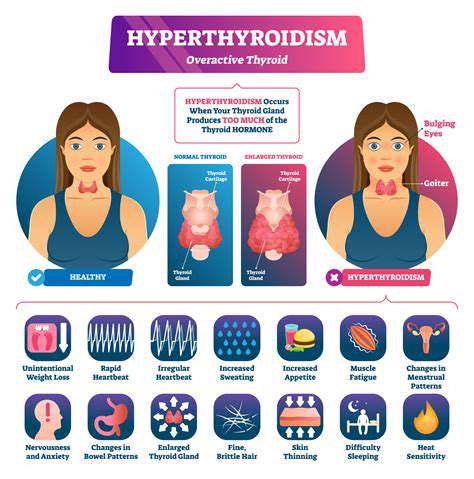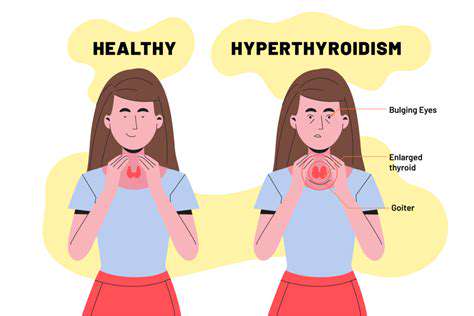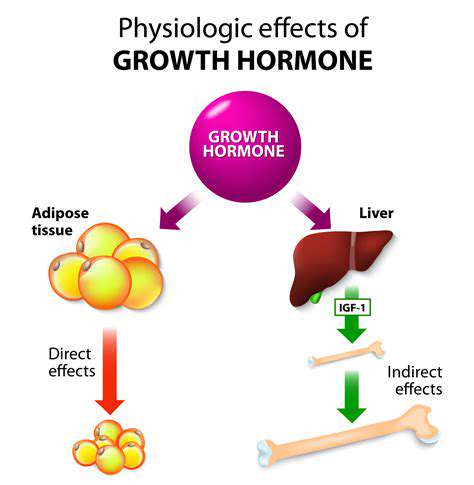The Relationship Between Thyroid Issues and Panic Attacks

The Fundamental Role of Thyroid Hormones
Thyroid hormones serve as master regulators throughout the body, orchestrating everything from how quickly we burn calories to how our organs develop. These chemical messengers, particularly thyroxine (T4) and triiodothyronine (T3), act like conductors in the symphony of our physiology. Their reach extends into every cell, ensuring tissues and organs perform their functions harmoniously.
This complex hormonal network interacts with nearly every bodily system, demonstrating why thyroid health is foundational to our overall equilibrium. The ripple effects of their activity touch multiple aspects of physical and mental wellness.
Iodine: The Building Block of Thyroid Health
Our bodies can't manufacture thyroid hormones without adequate iodine. When dietary iodine falls short, the thyroid gland falters in its hormone production, potentially triggering a cascade of health issues. Ensuring proper iodine consumption remains one of the simplest yet most powerful ways to support thyroid function.
When the Thyroid Stumbles: Common Disorders
Thyroid conditions disrupt the gland's delicate hormonal balance in different ways. Hypothyroidism slows bodily processes, while hyperthyroidism accelerates them - each condition carrying distinct symptoms and potential health consequences. Recognizing these differences proves essential for proper diagnosis and treatment.
Autoimmune conditions like Hashimoto's and Graves' disease illustrate how thyroid function intertwines with immune system activity, creating complex health challenges.
Recognizing the Warning Signs
Thyroid imbalances manifest through diverse symptoms that often mimic other conditions. Patients might experience anything from unexplained weight fluctuations to persistent brain fog. Paying attention to these bodily signals enables earlier medical intervention and better outcomes.
Diagnosis typically combines clinical evaluation with blood tests measuring hormone levels, sometimes supplemented by ultrasound or other imaging techniques.
Restoring Balance: Treatment Approaches
Treatment strategies vary based on the specific thyroid disorder. Hypothyroidism often responds well to synthetic hormone replacement, while hyperthyroidism may require medications to curb hormone production or procedures to reduce thyroid activity.
Metabolism: The Thyroid's Playing Field
As the body's metabolic thermostat, thyroid hormones determine how efficiently we convert food into energy. When this system falters, people often notice dramatic changes in their energy expenditure and weight.
Sustaining proper thyroid function helps maintain consistent energy levels and metabolic stability throughout life.
Sustaining Thyroid Health Long-Term
Managing thyroid conditions requires ongoing hormone monitoring, treatment adherence, and lifestyle modifications. Proactive measures like consuming iodine-rich foods and staying active can significantly support thyroid function.
Early detection and consistent management help prevent the more serious complications associated with chronic thyroid disorders.

Beyond the Hormones: Other Factors to Consider

The Lifestyle Connection
While hormones receive much attention, numerous daily habits and choices profoundly influence emotional stability. These often-ignored factors can dramatically shape our psychological resilience and mood patterns. Everything from sleep hygiene to nutritional intake weaves together to form our emotional baseline. Recognizing these connections allows for more comprehensive approaches to mental wellness.
Physical activity deserves special mention. Movement triggers the release of natural mood elevators while helping regulate stress chemistry. Consistent exercise not only improves sleep but also builds emotional stamina. Nutritional choices equally matter - the brain requires specific nutrients to maintain balanced neurotransmitter function. Poor dietary patterns can leave individuals emotionally vulnerable and mentally foggy.
The Human Connection Factor
Our relationships serve as emotional anchors. Meaningful connections provide comfort, shared joy, and practical support during difficult times. Conversely, social isolation often correlates with increased anxiety and depressive symptoms. Investing time in nurturing personal relationships pays dividends for mental health.
Support networks function as psychological safety nets. Knowing others genuinely care and will help during tough times reduces feelings of vulnerability. Cultivating these bonds represents one of the most effective emotional wellness strategies available.
Environmental Influences and Present-Moment Awareness
Our surroundings constantly shape our emotional states. Chronic stressors - whether workplace demands or financial pressures - gradually erode mental resilience. Similarly, lacking basic resources creates persistent anxiety that affects overall wellbeing. Identifying these environmental impacts allows for targeted stress-reduction strategies.
Mindfulness practices offer powerful tools for emotional regulation. Techniques like focused breathing or meditation help create space between stimuli and reactions. This mental training enhances our ability to navigate challenges with greater clarity and less distress.